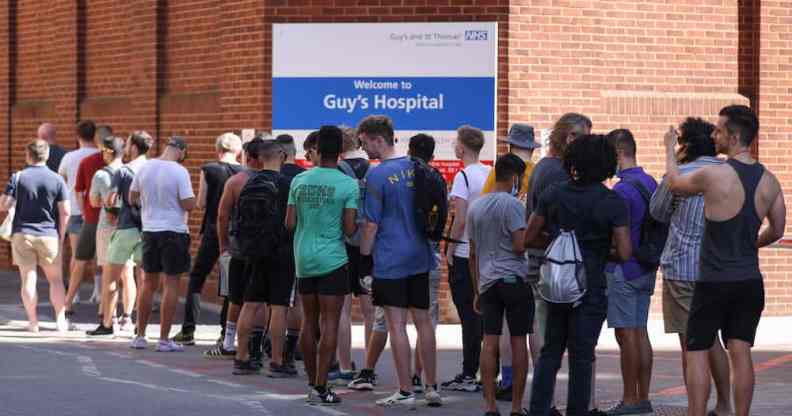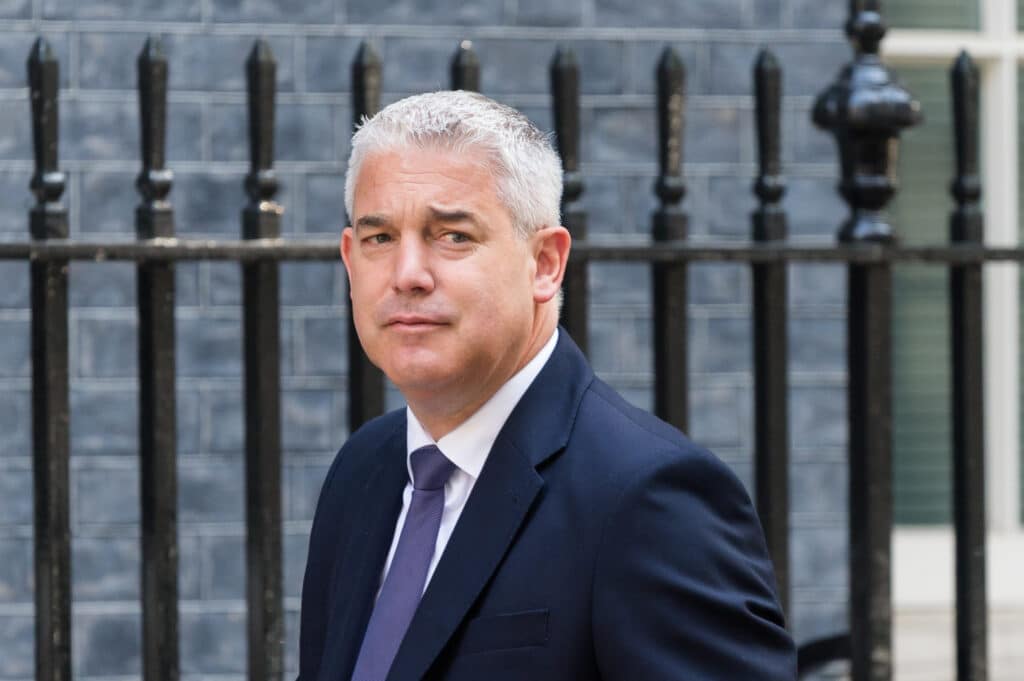Every major political party unites to demand government ‘get a grip’ on monkeypox

People line up to receive monkeypox vaccinations at London’s Guys Hospital. (Getty/ Hollie Adams)
Monkeypox could become “endemic” if the British government doesn’t “get a grip” on the outbreak, LGBTQ+ groups from across the political spectrum have warned.
The LGBTQ+ groups of the Conservative Party, Labour, Liberal Democrats, Greens and Scottish National Party issued an impassioned plea to health secretary Steve Barclay on Friday (5 August).
They called on the government to move more aggressively to target monkeypox. While it appears too late to eradicate the virus, they urged the government not to let it become endemic.
After the World Health Organisation declared a global health emergency, the groups asked the government to treat it as one.
“We are united as LGBT+ groups from across political parties in asking that the government treat the monkeypox outbreak as a public health emergency,” the groups said in a letter shared by sexual health charity the Terrence Huggins Trust (THT).
“We cannot afford to allow monkeypox to become endemic in the UK. Luckily, we have the tools required to stop this outbreak and prevent further risk to health now. We ask that you do so urgently.”
As of Tuesday (2 August), there are 2,672 confirmed and 87 highly probable monkeypox cases in Britain, according to the UK Health Security Agency. Almost all cases have been among gay and bisexual men.
The letter described the widespread fear among the LGBTQ+ community of the virus, which primarily spreads through close skin-to-skin contact and causes painful lesions and rashes that sometimes lead to hospitalisation.
“We need clear, non-stigmatising messaging, delivered direct to GBMSM [gay and bisexual men and men who have sex with men] about the symptoms of monkeypox and what to do if you suspect you have the virus to inform and reassure people (rather than the current broadcast to all approach that constantly mentions GBMSM).”

Health secretary Steve Barclay has faced mounting pressure to curb monkeypox cases. (Wiktor Szymanowicz/Future Publishing via Getty Images)
Health officials should get targeted public health message out through queer dating apps, online services and queer media, they suggested.
Echoing the early days of the COVID-19 pandemic, monkeypox tests are still not widely available and a vaccination programme for gay and bisexual men was only rolled out in June. The UKHSA has said queer men should wait for the NHS to contact them if they are eligible rather than come forward.
The monkeypox vaccine, known as Imvanex in Europe and Jynneos in the US, has been increasingly in short supply, with the government criticised for moving too slowly to secure more doses for the LGBTQ+ community.
“Sexual health experts estimate that at least 250,000 vaccines are needed to give two doses to 125,000 people,” the groups wrote, “but UKHSA has procured just over half this amount and estimates that only 50,000 people need to be vaccinated.”
Despite it being nearly three months since the first identified case, the government has yet to put in place a financial support scheme for those self-isolating with the virus.
“We must learn the lessons of the COVID 19 pandemic and ensure that no one required to self-isolate is forced to choose between protecting theirs and other people’s health, or affording essentials like food and rent,” the letter continued.
Matthew Lloyd and Evie Brooks, co-chairs of LGBT+ Labour, said in a statement that the additional strain of monkeypox on sexual health services will put other public health concerns, such as HIV, on the line. This could hamper years-long efforts to end new HIV transmissions by 2030.
“We are very worried that while mass vaccination events are a great way of building confidence that vaccinations are happening they can be a driver of inequality, especially when there is an undersupply of jabs,” they said in a statement to PinkNews.
“It is time to get improved systems and more purchasing of this much-needed vaccine.”
THT’s policy head Ceri Smith had a simple message to Barclay: “We need urgent political action to get a grip on the UK’s rapidly rising number of monkeypox cases.
“That’s why we’re grateful to the LGBT+ groups from the different political parties uniting to call for a public health response that’s proportionate to the size of the problem while gay and bisexual men continue to make up the vast majority of cases.”

